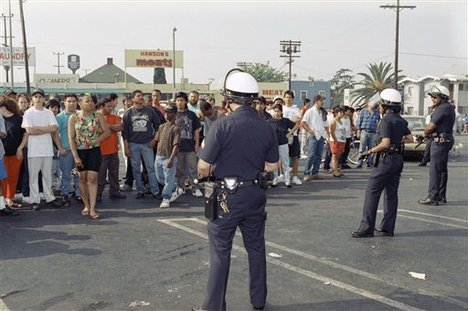60:36

10. Introduction to Neuroscience I
10. Introduction to Neuroscience I
(April 21, 2010) Nathan Woodling and Anthony Chung-Ming Ng give a broad overview of the field of neuroscience and how it relates to human biology. They discuss the different lobes of the brain and the cells within as well as neuropharmacology and re-uptake. Stanford University www.stanford.edu Stanford Department of Biology http Stanford University Channel on YouTube www.youtube.com
5:54

Neuroscience and Free Will
Neuroscience and Free Will
In this clip, Marcus Du Sautoy (Professor of Mathematics at the University of Oxford and current Simonyi Professor for the Public Understanding of Science) participates in an experiment conducted by John-Dylan Haynes (Professor at the Bernstein Center for Computational Neuroscience Berlin) that attempts to find the neurological basis for decision making.
73:03

11. Introduction to Neuroscience II
11. Introduction to Neuroscience II
(April 23, 2010) Patrick House discusses memories and how they are formed. Dana Turker then lectures about the autonomic nervous system and its functions. Stanford University www.stanford.edu Stanford Department of Biology http Stanford University Channel on YouTube www.youtube.com
62:10

The Neuroscience of Emotions
The Neuroscience of Emotions
Google Tech Talks September 16, 2008 ABSTRACT The ability to recognize and work with different emotions is fundamental to psychological flexibility and well-being. Neuroscience has contributed to the understanding of the neural bases of emotion, emotion regulation, and emotional intelligence, and has begun to elucidate the brain mechanisms involved in emotion processing. Of great interest is the degree to which these mechanisms demonstrate neuroplasticity in both anatomical and functional levels of the brain. Speaker: Dr. Phillippe Goldin
22:55

Neuroscience - "The world is a construct of sensation, perception, memories"
Neuroscience - "The world is a construct of sensation, perception, memories"
17:44

TEDxCMU - Ardon Shorr - Unlocking Music with Neuroscience
TEDxCMU - Ardon Shorr - Unlocking Music with Neuroscience
Ardon Shorr graduated from Oberlin College majoring in neuroscience and music theory, then taught fencing in Manhattan. He is currently pursuing a Ph.D. in biology at Carnegie Mellon with a research fellowship from the National Science Foundation. To get involved, please e-mail UnlockTheMusic.TEDx@gmail.com Thank you to Shawn Roggenkamp for photography, James Ranson for help with the talk, Dave Cummings for video, and the entire TEDxCMU team. You can find Variations Audio Timeliner online for free: variations.sourceforge.net Songs: OC Times: "Grow Old With You" itunes.apple.com They also have a great performance on youtube: www.youtube.com Schubert: Zwölf Grazer Walzer D924 Foster the People: "Pumped up Kicks" itunes.apple.com The Beatles: "Oh! Darling" itunes.apple.com Bob Marley & the Wailers: "Buffalo Soldier" itunes.apple.com The Cure: "Friday I'm In Love" itunes.apple.com Ben Folds: "One Angry Dwarf and 200 Solemn Faces" itunes.apple.com Mahler: Symphonies No. 1, 3, 4 and the lied "Zu Straßburg auf der Schanz." In the spirit of ideas worth spreading, TEDx is a program of local, self-organized events that bring people together to share a TED-like experience. At a TEDx event, TEDTalks video and live speakers combine to spark deep discussion and connection in a small group. These local, self-organized events are branded TEDx, where x = independently organized TED event. The TED Conference provides general guidance for the TEDx program, but individual TEDx events are <b>...</b>
40:23

Medical neuroscience - Somatosensory pathways
Medical neuroscience - Somatosensory pathways
This is a brief (well... 40 min) video that describes the somatosensory tracts from the body back to the cortex. The dorsal column-medial lemniscal system and anterolateral system are discussed along with some spinal cord lesions.
2:39

Norton Neuroscience Institute begins new MS clinical trial.mov
Norton Neuroscience Institute begins new MS clinical trial.mov
Robert S. Tillett Jr., MD, the neurologist in charge of clinical research studies for multiple sclerosis (MS) at Norton Neuroscience Institute, says these are exciting days in the treatment of this autoimmune disease. And he says MS patients in Greater Louisville are the ones who'll benefit. A fifth clinical trial, this one sponsored by the National Institutes of Health and the Immune Tolerance Network, has just begun. Norton Neuroscience Institute has more MS research under way than any other group in the region. Get Healthy's Jackie Hays tells us how this latest clinical trial is especially good news for a Crestwood woman and other MS patients in Greater Louisville.
3:35

The University of Bristol: Neuroscience in Bristol and beyond
The University of Bristol: Neuroscience in Bristol and beyond
The Centre for Public Engagement at the University of Bristol commissioned KWMC to produce four web videos relating to the University's work with the general public. In 'Neuroscience in Bristol and beyond: engaging the public with neuroscience' Professor Bruce Hood, Dr Nathalia Gjersoe and Kate Longstaffe, Experimental Psychologists at various stages in their careers, discuss how they have been involved in public engagement.
4:11

What is Computational Neuroscience?
What is Computational Neuroscience?
A short film explaining the principles of this field of neuroscientific research.
58:03

Neuroscience and the Emerging Mind: A Conversation with the Dalai Lama
Neuroscience and the Emerging Mind: A Conversation with the Dalai Lama
(Visit: www.uctv.tv for more video) His Holiness the Dalai Lama engages with Larry Hinman of the University of San Diego, VS Ramachandran of UC San Diego and Jennifer Thomas of San Diego State University in a scientific and philosophical discussion of human consciousness. This is the final event of the Dalai Lama's "Compassion Without Borders" tour sponsored by San Diego's three largest universities. Series: "Dalai Lama" [5/2012] [Humanities] [Science] [Show ID: 23653]
29:27

Dr Paul Howard-Jones - Neuroscience, Games & Learning
Dr Paul Howard-Jones - Neuroscience, Games & Learning
Dr Paul Howard-Jones, a leading expert on the role of neuroscience in educational practice and policy with a particular interest in how gaming engages the brain and the application of this knowledge in education. Paul discusses the findings of his recent research that reviews the potential effects of video games and social media on the brain. Presented at the Learning Without Frontiers Conference, London, January 26th 2012 www.learningwithoutfrontiers.com
1:57

The Neuroscience Of Leadership
The Neuroscience Of Leadership
We have a pretty good idea how neural networks are laid down. Deepak Chopra believes that we can hardwire the brain specifically to develop better leadership abilities. Our cortex in our brain is effected by reflective activities, the limbic brain emotional activities, reptilian brain is effected by the flight or fight response . The word Leaders can be used as an acronym to remember the areas that need to be trained through mental exercises to become a better leader. The areas are Look and listen, Emotional bonding , Awareness, Doing, Empowerment, Responsibility and Synchronicity.
69:57

Twenty-first Century Neuroscience: From Lab and Clinic to Home, School and Office
Twenty-first Century Neuroscience: From Lab and Clinic to Home, School and Office
Twenty-first Century Neuroscience: From Lab and Clinic to Home, School and Office Air date: Wednesday, May 02, 2012, 3:00:00 PM Timedisplayed is Eastern Time, Washington DC Local Category: Wednesday Afternoon Lectures Description: Until recently, advances in brain science have fallen into one of two categories: basic science and applied medical science. In the past few years a new category of advance has emerged: neuroscience applied to nonmedical problems, from fields as diverse as business, law, education and warfare. I will present possible reasons for this change in the landscape of neuroscience research and development, review some illustrative examples, and discuss some of the ethical, legal and societal implications of nonmedical applied neuroscience. The NIH Wednesday Afternoon Lecture Series includes weekly scientific talks by some of the top researchers in the biomedical sciences worldwide. For more information, visit: The NIH Director's Wednesday Afternoon Lecture Series Author: Dr. Martha J. Farah, University of Pennsylvania Runtime: 01:10:01 Permanent link: videocast.nih.gov
85:27

Authors@Google: Dario Nardi - Neuroscience of Personality
Authors@Google: Dario Nardi - Neuroscience of Personality
UCLA professor and author, Dario Nardi, has discovered that people of different personality types don't merely rely on different brain regions -- they use their brains in fundamentally different ways. Using colorful anecdotes and brain imagery, Dr. Nardi shares key insights from his lab. Among these insights: how people of different personalities can find and sustain a state of creative flow. This talk is suitable for a general audience including those who have passing familiarity with the Myers-Briggs types.
4:41

MW3 Team Spray Gameplay - Auditory Neuroscience
MW3 Team Spray Gameplay - Auditory Neuroscience
Would love to hear from you guys on this one! Ratings are awesome too! Like the Facebook Page: www.facebook.com Follow me on the Twitter: twitter.com Check out my T-Shirt store: vikkstar123.spreadshirt.com Click this link to go to the CoDKarnage channel: www.youtube.com MW3 Random Weapons Gameplays www.youtube.com MW3: Live Gameplays www.youtube.com MW3: Team Throwing Knife www.youtube.com MW3: Throwing Knife Tutorials www.youtube.com MW3 Short & Sweet Clips www.youtube.com MW3 Gameplay www.youtube.com
18:39

TEDxEnola - Jane Kise - Neuroscience, Jungian Type and Mathematics: Insights into Student Struggles
TEDxEnola - Jane Kise - Neuroscience, Jungian Type and Mathematics: Insights into Student Struggles
TEDxEnola: February 1st, 2012 Dr. Jane Kise Neuroscience, Jungian Type and Mathematics: Insights into Student Struggles Enola, Pennsylvania In the spirit of ideas worth spreading, TEDx is a program of local, self-organized events that bring people together to share a TED-like experience. At a TEDx event, TEDTalks video and live speakers combine to spark deep discussion and connection in a small group. These local, self-organized events are branded TEDx, where x = independently organized TED event. The TED Conference provides general guidance for the TEDx program, but individual TEDx events are self-organized.* (*Subject to certain rules and regulations)
51:52

Challenges of Neuroscience - Who are we and if so, why?
Challenges of Neuroscience - Who are we and if so, why?
facebook.com ... Meeting Einstein Lecture: "Challenges of Neuroscience - Who are we and if so, why?" - Roger D. Traub, State University New York. "Meeting Einstein" - outstanding academics present their findings to the Berlin public. --- Please SUBSCRIBE to SCIENCE & REASON: • www.youtube.com • www.youtube.com • www.youtube.com --- We have explored almost the entire surface of the earth, have been to the moon and manned space flights to Mars are being planned. But in the exploration of our innermost being, our brain, we are only just at the beginning. Einstein Visiting Fellow Roger D. Traub invites you on a journey into the brain, explains the challenges research is facing and what route he takes to get to the bottom of the secrets. The important goals of Neuroscience are: • First of all clinical, to improve the prevention and treatment of neuropsychiatric disorders. • Second technological, to gather hints how we might imitate brain functions in intelligent artifacts and software. • And third, the underlying philosophical goal, to understand our own origins and nature. Why are these goals so difficult to achieve, despite extreme efforts by tens of thousands of researchers? Why is it so hard to understand the brain? According to Roger Traub these goals require that that we should be able to relate "psychological" functions to the behaviors of large networks of cells. How? By expressing the properties and connections of these networks in equations and in a mathematical <b>...</b>
14:27

Cognitive Computing: Neuroscience, Supercomputing, Nanotechnology (part 1 of 4)
Cognitive Computing: Neuroscience, Supercomputing, Nanotechnology (part 1 of 4)
The ultimate goal of the DARPA SyNAPSE project is to build brain-like cognitive computing chips that scale to human cortex by moving beyond the von Neumann architecture and become the brains behind IBM's Smarter Planet vision. The project leverages nanotechnology, supercomputing, and neuroscience and is a collaboration of four universities (Cornell, Columbia, Wisconsin-Madison, and UC Merced) and five IBM sites (Almaden, Yorktown, EFK, BTV, and IRL). Dr. Dharmendra S. Modha is founding manager of the Cognitive Computing group at IBM's Almaden Research Center. Currently, he is the Principal Investigator for DARPA SyNAPSE team of IBM Research - Almaden, IBM Research - Watson, University of Wisconsin-Madison, Cornell University, Columbia University, and University of California at Merced.
8:31

Neuroscience for Teachers! by Robert S. Murphy
Neuroscience for Teachers! by Robert S. Murphy
FAB3 is an international Neuro-EFL conference held at the University of Kitakyushu, July 14th-16th, 2012. Visit fab-efl.com for more details about the presenter and FAB3. "Neuroscience for Teachers Creating Champion Students!" Robert S. Murphy performs a PechaKucha format presentation on how Neuroscience can and should be incorporated into any classroom or learning context for amazing results. Great information for any teacher, parent, or student. Robert S. Murphy studied Mind, Brain, and Education at the Harvard Graduate School of Education and is completing his PhD in Psycholinguistics at the University of Nottingham. Robert also has and MA in TEFL/TESL from the University of Birmingham. FAB3 is an international Neuro-EFL conference held at the University of Kitakyushu, July 14th-16th, 2012. Visit fab-efl.com for more details about the presenter and FAB3.
6:28

The Plastic Brain: UAB Neuroscientists Stretch the Boundaries of the Mind
The Plastic Brain: UAB Neuroscientists Stretch the Boundaries of the Mind
UAB scientists on the cutting edge of neuroscience discuss their mind-bending research.
15:34

Hugo de Garis - Approaches to AI, Neuroscience, Engineering, intelligence Theory, Cyborgs
Hugo de Garis - Approaches to AI, Neuroscience, Engineering, intelligence Theory, Cyborgs
Interview with Hugo de Garis. Approaches to AI, Neuroscience, Engineering, Intelligence Theory, Cyborgs Yearly conferences that Hugo de Garis has spoken at. hplusconf.com.au http


































































